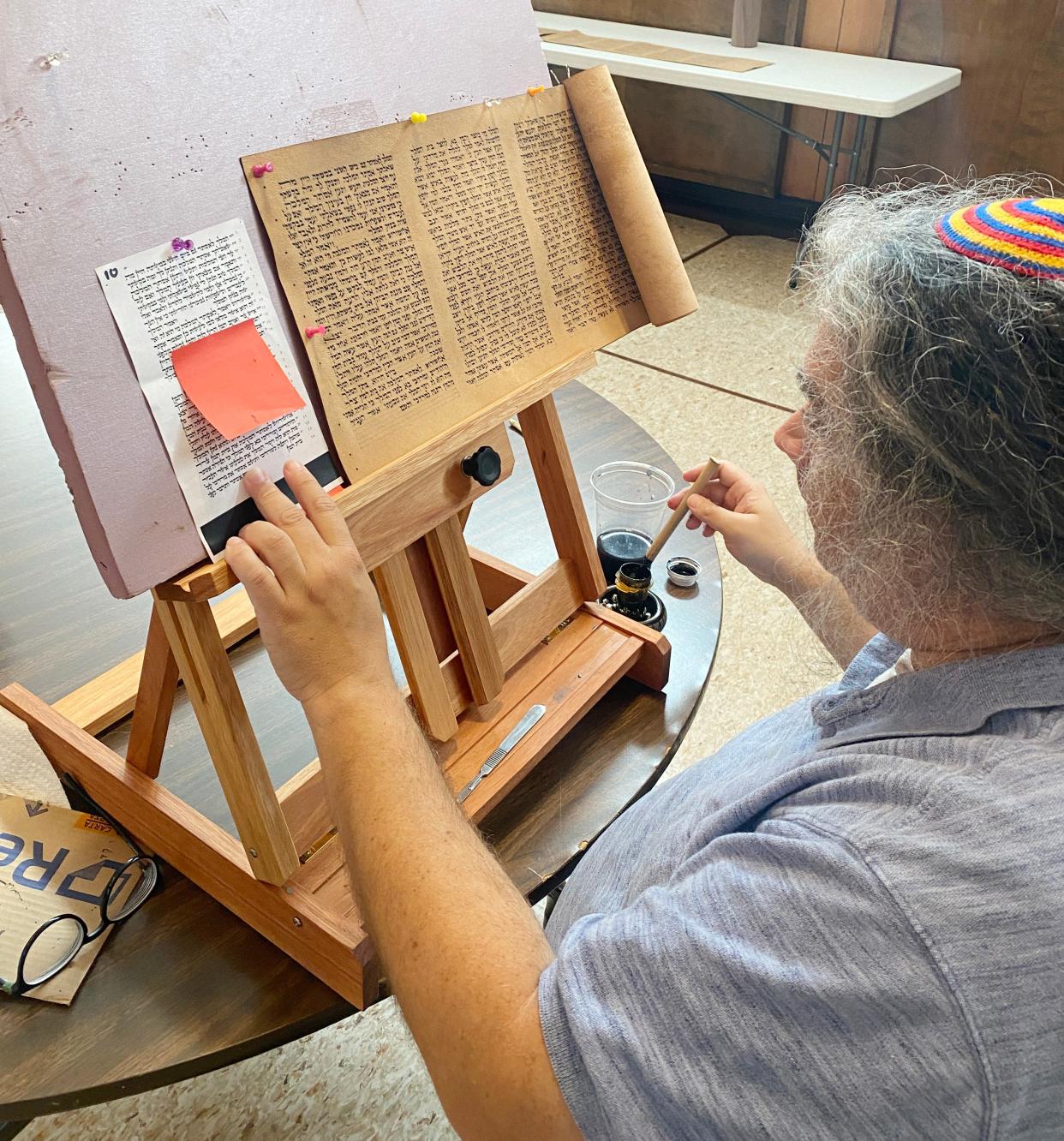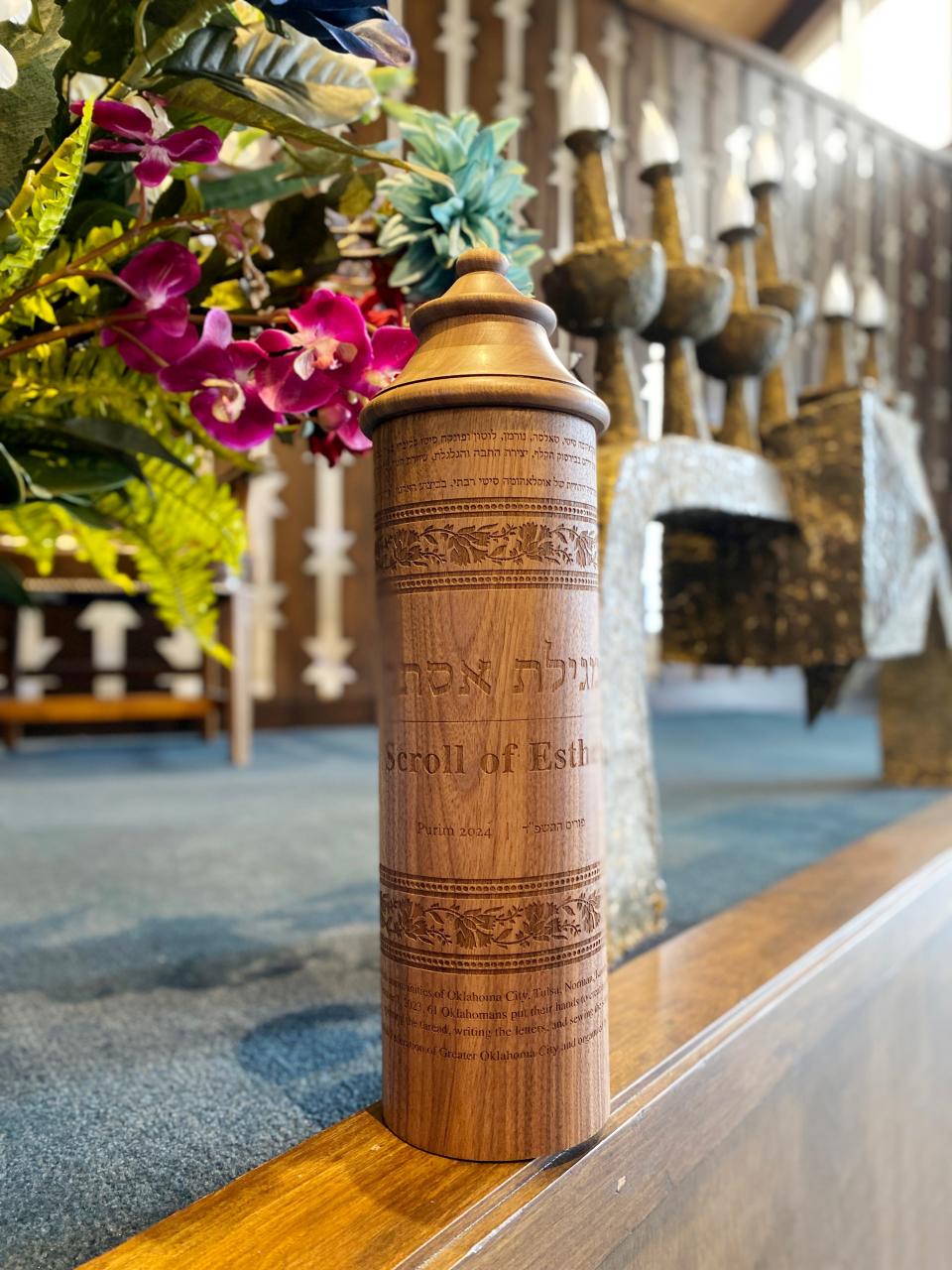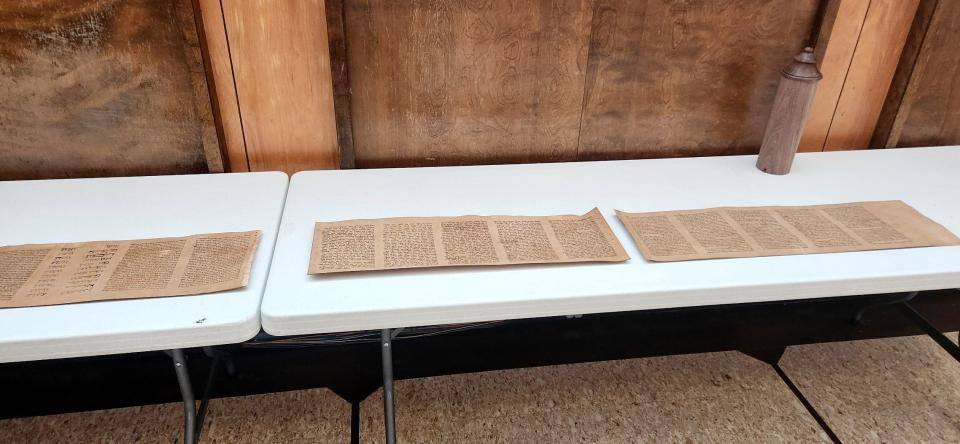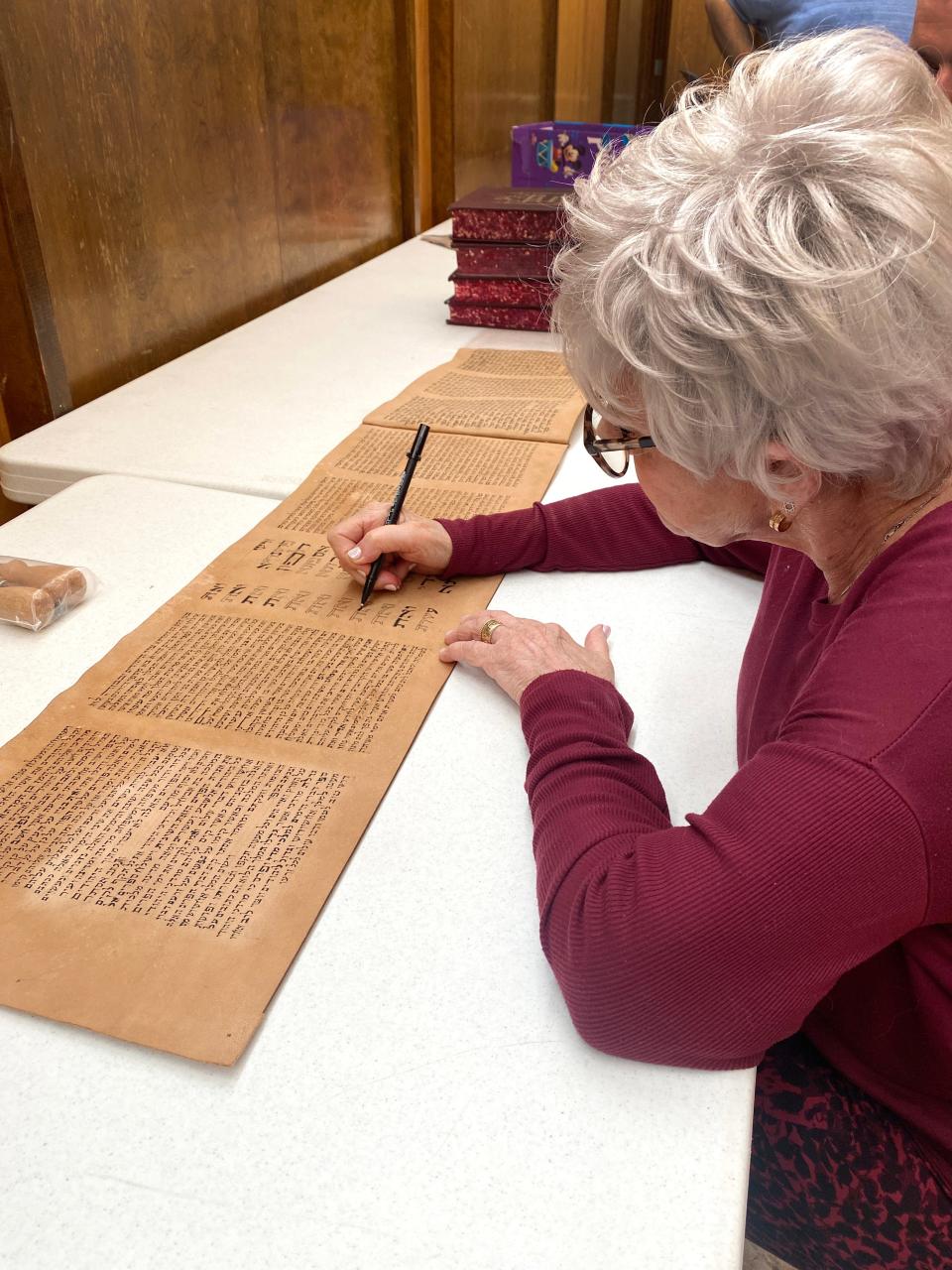When Israeli kibbutz lost sacred texts to attack, these nontraditional Oklahoma scribes stepped in

An Israeli community is observing the Jewish holiday of Purim with a sacred item made by a group of Oklahomans halfway across the globe.
Rabbi Juan Mejia, of Oklahoma City, said he and other members of The Kedusha Project inscribed a parchment scroll with the Book of Esther as "an act of solidarity" with Kibbutz Be'eri, an Israeli community that was attacked on Oct. 7 by Hamas militants. It was sent to Israel in time for it to be read according to Jewish tradition during Purim, which began at sundown on Saturday, March 23.
"The Jewish community is grieving — we are not OK," he said.
"This is a way in which we Oklahoma Jews do something. We've been praying, of course. We've been learning, and donating, but this allows us to say 'this is how we show you our love and our grief,' and it's important to us to do this."

Mejia said "kedusha" means "holy" and in the context of The Kedusha Project, it means "making holy objects." He said The Kedusha Project is an Oklahoma-based group on a mission to open up opportunities for "the historical Jewish 'other'" — including women, Jewish converts and LGBTQ+ community members — to participate in sacred Jewish crafts such as the inscribing of parchment scrolls. Kedusha Project member Yonathan Reches said scribing is traditionally dominated by men who are heterosexual and cisgender, a term describing people whose gender identity matches the sex they were assigned at birth.
The group connected to Kibbutz Be'eri when Reches found out that some sacred items belonging to the kibbutz were destroyed during the Oct. 7 Hamas attack. He reached out to one of the community members, only to learn that she had been wondering how the kibbutz would replace a parchment scroll inscribed with the Book of Esther in time for the Purim holiday.
The Book of Esther, called The Megillah in the Jewish faith tradition, is read from a parchment scroll during Purim, as one of the holiday's sacred rituals. The Megillah tells the story of how Persian Queen Esther saved the Jewish people from persecution by Haman, and Purim commemorates Persian Jews' victory over oppression, as chronicled in The Megillah/Book of Esther.

Mejia said most of the local members of The Kedusha Project are members of Emanuel Synagogue in Oklahoma City, where he serves as a Jewish educator, and his wife, Rabbi Abby Jacobson, serves as the congregation's spiritual leader. He said Jacobson was an encouraging part of the effort along with Emanuel Synagogue, where the group often gathered to work on the scroll.
Jacobson was complimentary of The Kedusha Project's scroll, which is being described as "the Oklahoma Esther."
"I am so proud that our community has built such an engaging, Earth-friendly immersive program. ... There is no other community as intentional about including marginalized Jews within sacred work," she said.
"As a rabbi, even I have been barred from this work because I am female, and now we are able to offer the blessing of serving the community to the widest possible number of Oklahoma's Jewish people. In the Book of Esther, the Jewish community was saved by a kind and resourceful woman and by the simple piety of ordinary people. The founders of the Kedusha Project echo the kindness, the resourcefulness and the simple piety that the Book of Esther celebrates."
Mejia said Kedusha Project members wanted to expand the Esther parchment scroll effort to include Jews across Oklahoma and participants from those areas fully embraced the opportunity to connect with their Israeli counterparts.
"We took it to Tulsa, we took it to Ponca City, to Lawton, to Norman, to all of these other communities to help other people participate, so this is our broad definition of the Jewish community," Mejia said.
Yeches said more than 60 Oklahomans helped create the unique scroll, and it may be the first parchment scroll of Esther written or inscribed in Oklahoma. The participants were given opportunities to put a letter or a stitch on the scroll.
"People were very excited to create this important ritual object for a community that had lost it in very tragic circumstances," he said.
Mejia described the statewide effort as "amazing."
"How wonderful is it that we can all participate in this mitzvah, this commandment — a great act of spiritual solidarity — with a community that is in pain, showing that halfway across the world, 'strangers love you — and here is a gift from us,'" he said.
More: Oklahoma City man's faith journey leads him to Judaism
'Fast-tracked' prayer
Reches said Kibbutz Be'eri was mourning the loss of members of the community who had been killed or taken hostage when Hamas militants attacked the community. He said as survivors of the attack were attempting to recover, they realized that they had lost something more. Their Torah scrolls, including a 240-year-old scroll of the Book of Esther, had been reduced to ashes in a fire that occurred during the Oct. 7 attack.
Reches said people in Israel are writing or inscribing Torah scrolls to replace the items that were lost in the fire. A Torah scroll contains the text of the five books of Moses handwritten by a scribe in Hebrew. He estimated that a complete Torah scroll would take about 40 times longer to create and would also be an expensive gift. Thus, instead of an entire Torah scroll, he told the kibbutz leader that The Kedusha Project could inscribe an Esther scroll because he deemed this was something that the Oklahoma Jewish community could provide.
"I said, 'Look, we're a small community, we don't have the resources to write you a Torah scroll. Would you like a scroll of Esther?' And she said, 'we need one,'" Reches said.

"It turns out that she had just been praying that someone would provide her a scroll of Esther. I think her prayers got fast-tracked."
From Oklahoma to Israel
Cantor Beth Weiner had the honor of taking the Esther scroll to its final destination at the end of February. Weiner was visiting Oklahoma and agreed to take the special gift when she returned to her home in Jerusalem.
She said she was inspired by the Kibbutz Be'eri member when they met to exchange the scroll. Weiner said the kibbutz member told her that the surviving community members were mourning for their loved ones but wanted to return to their community synagogue to read the scroll on Purim "as a statement that 'we're are still here.'"
"I love that," Weiner said. "I found her inspirational because she said ... 'We have to get up. We mourn, but we continue to live because if we stop living, then that's no way to honor our people who are gone.'"
An inclusive effort
Reches said it took Oklahomans about two weeks to create the scroll. The effort was funded by the Jewish Foundation of Oklahoma City, a supporting organization of the Jewish Federation of Greater Oklahoma City. The Kedusha Project members used deer hide to create the parchment — traditionally animal skin that has been prepared for writing or printing. Mejia said the group also made the pens that were used for the inscription, and a local artisan handcrafted the wooden holder in which the scroll was placed.
Mejia said being part of the effort to create a holy ritual object like the scroll was especially meaningful to him because he wouldn't have been able to take part as someone who converted from Catholicism to Judaism. Hannah Grillot, of Oklahoma City, is another member of the Kedusha Project who is grateful for its mission and the recent opportunity to help craft the scroll. Grillot also grew up Catholic only to embrace Judaism as an adult. She said she is aware that as a woman and a convert, being part of the Kedusha Project is the only way she would be allowed to participate in the crafting of holy objects.
More: Joe Biden, Benjamin Netanyahu speak for first time in a month as tensions rise over Gaza war
"It's very meaningful to me to have a community that sees me as just as much of a person, as much of a Jew, as anyone else in order to create the sacred objects that are very important to us," Grillot said.
Meanwhile, as Kedusha Project members at Emanuel Synagogue and across Oklahoma celebrate Purim, Mejia said the group will be thinking of Kibuttz Be'eri members who received the gift of the Oklahoma-crafted Esther scroll.
The rabbi said the scroll's creation was a wonderful learning experience for the Oklahomans who made it.
The unique Megillah wasn't produced by professional scribes, "but it's done with the love of a community," he said.
This article originally appeared on Oklahoman: Oklahoma Jewish group sent Esther scroll to Israel for Purim

